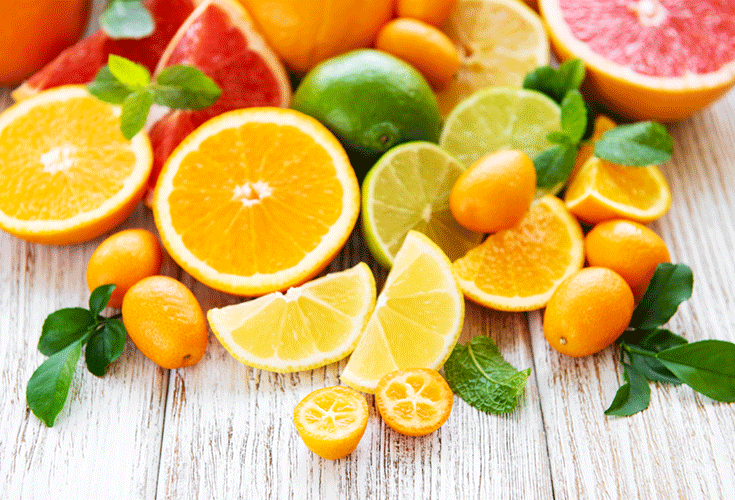Citrus fiber is the "go-to" clean label ingredient, especially Citri-Fi® citrus fiber. This natural citrus fiber sets itself apart from other citrus fibers due to its sustainable story, patented technology and superior functional benefits. For instance this citrus fiber or citrus fiber extract provides high water holding, emulsification and gelling properties. In addition, it cleans up food labeling. Learn more about this superior citrus fiber by checking out the frequently asked questions.
Because of citrus fiber's clean label functional benefits in food and beverage products, the food industry placed citrus fiber in the limelight. As a result, customers continue to ask questions about this superior natural ingredient. Below, we captured and shared common questions asked about this excellent clean label food ingredient.
Citrus Fiber: Frequently Asked Questions
1. What is Citrus Fiber?
Citrus fiber consists of insoluble and/or soluble fibrous components of citrus fruits such as orange, lemon and limes. Though most people automatically assume that food makers use citrus fiber for fortification purposes such as "adding fiber", this is not the case for citrus fibers like Citri-Fi®. Not all citrus fibers are created the same. For instance, Citri-Fi uses a process free from chemicals to convert byproduct or "upcycled" material produced by the citrus juicing industry into higher valued products. As a result, the patented mechanical process opens up the fiber to provide high surface area.
Because of the high surface area and composition, this citrus fiber can be used at very low levels while providing high functional benefits such as water holding, emulsification and gelling. Citri-Fi contains high amounts of both insoluble and soluble fiber, especially native pectin, that provide the functional benefits. Because of this, Citri-Fi improves texture, taste and stability of food first and contributes some dietary fiber second.
Key differences separate Citri-Fi citrus from others in the market. Citri-Fi adheres to a sustainable model using byproducts from food processes. Other fibers use grind and grow models. In other words, other suppliers specifically source their materials from products grown specifically to be processed into plant fibers. In addition, some citrus fibers contain mostly insoluble fiber. As a result, they provide limited functionality in the food product. Lastly, Citri-Fi uses a process free from chemical modifications. Other processors use alcohol washes and other chemicals to create their products.
2. What is Citrus Fiber Made From?
Citrus fiber can be made from different citrus fruits such as orange, lemon or limes which are the most common raw materials.
3. What is Citrus Fiber Extract?
Citrus fiber extract serves as another description for citrus fiber. Some ingredient suppliers use this terminology to try and differentiate their citrus fiber products from others in the market. Ultimately, food labeling trumps when it comes to describing this natural ingredient. For example, the FDA labeling guidance for Citri-Fi includes the following options: citrus fiber, dried citrus pulp or citrus flour. And the USDA fallows citrus flour or dried citrus pulp. These labeling options resonate well in the natural and clean label markets.
4. Is Citrus Fiber a Natural Emulsifier?
Not all citrus fibers on the market provide emulsification benefits. However, Citri-Fi citrus fiber does. This natural citrus fiber extract has high surface area that easily traps water and oil. Also the fibrous composition contains lipophilic and hydrophilic ends which attracts the oil and water into the matrix which further binds the two. For instance, Citri-Fi binds oil and water to create emulsions that are used in food applications such as dressings, sauces, beverages, dairy and meat alternatives like patties. Another feature is that this natural citrus fiber serves as a plating agent. In other words, Citri-Fi, when mixed with oil, turns difficult-to-use liquids into flowable powders. As a result this benefits foods like beverages, meats and sauces.
5. Is Citrus Fiber an Allergen?
Citrus fiber is allergen-free.
6. Is Citrus Fiber Gluten-free?
Citrus fiber is also gluten-free.
7. What is Citrus Fiber Composition?
As mentioned before, citrus fiber composition varies depending on the supplier. Each supplier uses different processing methods as well as sources different raw materials. Citri-Fi citrus fiber contains about 70% total dietary fiber consisting of both soluble and insoluble fiber. Moreover, this citrus fiber consists of high amounts of intact native pectin. In other words, this composition is as close to natural as nature intended. Other citrus fibers may contain more insoluble fiber. As a result, these types of citrus fiber need to be blended with other hydrocolloids to provide the same benefits as Citri-Fi citrus fiber.



